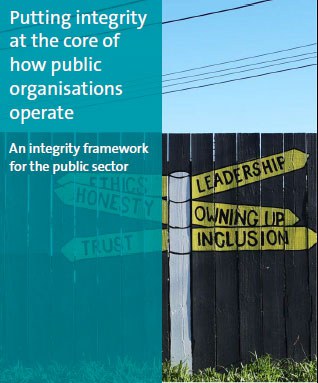Integrity roles and responsibilities
Why it matters: Sustained improvement to organisational integrity requires ongoing commitment, focus, and resources
Building integrity at an organisational level doesn't just happen. Research shows that it takes an ongoing commitment to implementing all the components set out in this framework. To achieve this, sufficient time and resource, combined with clear roles and responsibilities in your organisation, are essential.
What it looks like: Roles and responsibilities for managing integrity are assigned across the whole organisation
Organisations will have several integrity-related functions responsible for the different tasks associated with preventing, detecting, and responding to integrity matters. These will likely include people and capability teams, finance, legal, risk and compliance, and internal/external audit.
Responsibility for integrity doesn’t just sit at the top table. However, it does start there.”
Government department senior leader
The allocation of integrity roles and responsibilities will need to reflect the size, scale, and complexity of an organisation's operations and the type of integrity risks it faces. What is important is that each of the elements of this framework are well described and sit clearly within someone's responsibility in the organisation.
As well as that, it should be someone's role to bring together all the different parts of an integrity system (or framework) to monitor and measure progress at an organisational level.
Some organisations have a dedicated integrity advisor or unit to deal with integrity matters.47 However, they still need to work with other functions throughout the organisation to ensure that the management of integrity issues is integrated across the workplace.48 It is also important to ensure governance oversight of all integrity functions with responsibility for balancing prevention, detection, and response efforts.
We suggest that the following responsibilities are considered when assigning roles:
- A senior leadership team member as an integrity leader, to champion and ensure an ongoing commitment to integrity at an organisational level.
- Monitoring and reporting of integrity at an organisational level.
- Promotion of integrity matters across the organisation.
- Ensuring that integrity is regularly on the agenda for senior leadership team meetings.
- Identifying and ensuring alignment of progress on integrity matters with other work under way across the organisation.
- Engagement with frontline and middle management staff to uphold and enhance their position as role models and early responders to integrity issues.
- Support to staff who raise concerns.
It's worth considering...
 |
It's worth considering...
|
47: It is important to clearly identify which issues in your organisation are considered "integrity breaches" and covered by your integrity adviser or unit. Not all employment issues, for example, will be integrity breaches.
48: Taylor, Alison (2017), The Five Levels of Ethical Culture (working paper), BSR.


